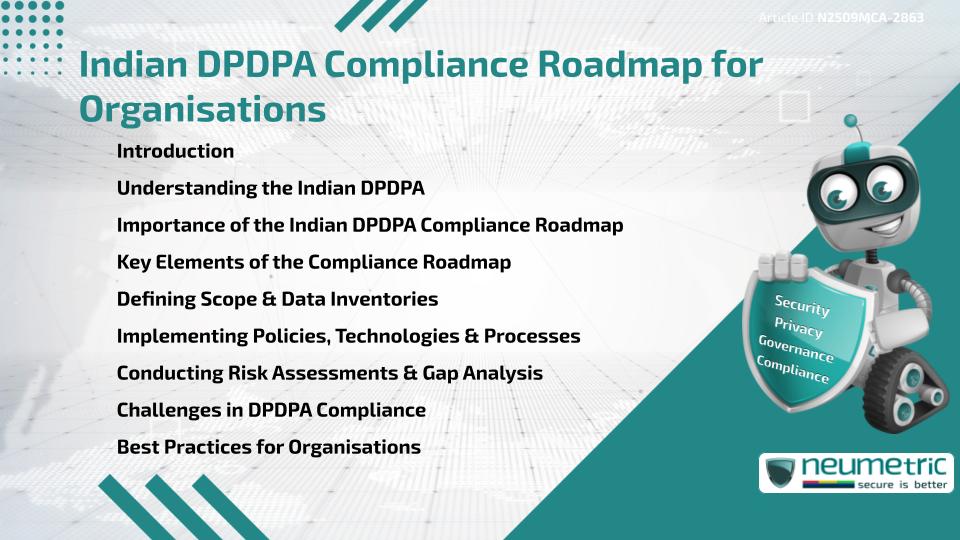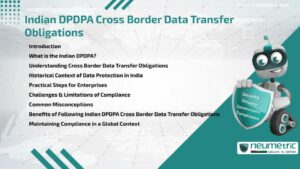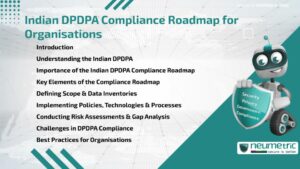Table of Contents
ToggleIntroduction
The Indian DPDPA compliance Roadmap guides organisations in meeting the requirements of the Digital Personal Data Protection Act [DPDPA]. This Roadmap ensures enterprises handle Personal Data responsibly, aligning with Ethical & Regulatory Standards. By following structured steps, organisations can build trust, avoid penalties & strengthen their Data Security posture. This article outlines the Roadmap, challenges & Best Practices for compliance.
Understanding the Indian DPDPA
The Digital Personal Data Protection Act [DPDPA] establishes rules for lawful collection, processing & storage of Personal Data in India. It emphasises principles such as consent, purpose limitation, data minimisation & accountability. The Indian DPDPA compliance Roadmap helps organisations interpret these obligations & implement practical steps for compliance.
Importance of the Indian DPDPA Compliance Roadmap
The Indian DPDPA compliance Roadmap ensures enterprises can:
- Protect the rights of Data Principals
- Demonstrate accountability to regulators
- Reduce Risks of Data Security breaches
- Build trust with Clients & Partners
Without a clear Roadmap, organisations may struggle with fragmented compliance efforts & increased exposure to penalties.
Key Elements of the Compliance Roadmap
Core elements of the Indian DPDPA compliance Roadmap include:
- Defining compliance scope
- Creating & maintaining data inventories
- Implementing security & Privacy Policies
- Conducting Risk Assessments
- Documenting Evidence of compliance
- Establishing grievance redressal mechanisms
Defining Scope & Data Inventories
Organisations must first define scope-identifying Systems & Data that fall under DPDPA. Maintaining accurate data inventories ensures visibility over Personal Data & helps in fulfilling obligations like consent management & data access rights.
Implementing Policies, Technologies & Processes
Policies, Technologies & Processes such as Access Controls, Encryption & Incident Response Plans must be implemented. Embedding these into daily operations ensures compliance is not theoretical but actively enforced.
Conducting Risk Assessments & Gap Analysis
Risk Assessments identify Assets, Risks & Vulnerabilities linked to Personal Data. A Gap Analysis highlights areas where current practices fall short of DPDPA obligations. Addressing these gaps strengthens compliance readiness.
Challenges in DPDPA Compliance
Organisations may face challenges such as:
- Resource Constraints for smaller businesses
- Complex documentation requirements
- Evolving Regulatory Standards & guidance
These hurdles require careful planning & Continuous Monitoring & Improvement.
Best Practices for Organisations
To follow the Indian DPDPA compliance Roadmap effectively, enterprises should:
- Conduct regular Internal & External Audits
- Train Employees on DPDPA obligations
- Use automation tools for data inventory & consent tracking
- Hold Management Review Meetings for compliance oversight
These practices streamline compliance & reduce the Risks of penalties.
Takeaways
- The Indian DPDPA compliance Roadmap provides structured steps for lawful data handling
- Data inventories & scope definition are central to compliance
- Policies, Technologies & Processes must be embedded into operations
- Risk Assessments & Gap Analysis improve readiness
- regular Audits & training support continuous compliance
FAQ
What is the Indian DPDPA compliance Roadmap?
It is a structured Framework of steps organisations must follow to comply with India’s Digital Personal Data Protection Act.
Why is the Indian DPDPA compliance Roadmap important?
It ensures lawful data handling, builds trust & reduces the Risk of penalties for non-compliance.
What are the key elements of the Indian DPDPA compliance Roadmap?
They include scope definition, data inventories, Policies, Risk Assessments & grievance redressal mechanisms.
Who must follow the Indian DPDPA compliance Roadmap?
All organisations handling Personal Data in India must follow it, regardless of size.
What challenges exist in following the Indian DPDPA compliance Roadmap?
Challenges include limited resources, complex documentation & evolving regulatory guidance.
How can organisations simplify the Indian DPDPA compliance Roadmap?
By using automation, conducting audits & training Employees on Compliance Requirements.
Does the Indian DPDPA compliance Roadmap align with Global Standards?
Yes, it shares principles with global Frameworks like GDPR, including consent, accountability & transparency.
Need help for Security, Privacy, Governance & VAPT?
Neumetric provides organisations the necessary help to achieve their Cybersecurity, Compliance, Governance, Privacy, Certifications & Pentesting needs.
Organisations & Businesses, specifically those which provide SaaS & AI Solutions in the Fintech, BFSI & other regulated sectors, usually need a Cybersecurity Partner for meeting & maintaining the ongoing Security & Privacy needs & requirements of their Enterprise Clients & Privacy conscious Customers.
SOC 2, ISO 27001, ISO 42001, NIST, HIPAA, HECVAT, EU GDPR are some of the Frameworks that are served by Fusion – a SaaS, multimodular, multitenant, centralised, automated, Cybersecurity & Compliance Management system.
Neumetric also provides Expert Services for technical security which covers VAPT for Web Applications, APIs, iOS & Android Mobile Apps, Security Testing for AWS & other Cloud Environments & Cloud Infrastructure & other similar scopes.
Reach out to us by Email or filling out the Contact Form…





